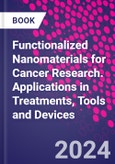Functionalized Nanomaterials for Cancer Research: Applications in Treatments, Tools and Devices presents an in-depth and step-by-step description of knowledge on functionalized nanomaterials for cancer research, including treatment and future developments as well as their impact on patients’ overall outcomes. The book discusses functionalized nanoplatforms for cancer detection and imaging, interactions between nanomaterials and cancer cells, and drug resistant malignancies. The book's chapters are organized in a manner that can be readily adopted as sources for new and further studies by highlighting the main in vitro and in vivo nano-therapeutic achievements on cancer. Additionally, current trends on functionalized nanomaterials for cancer research and commercial scale opportunities are discussed. This is a valuable resource for researchers, oncologists, students, and members of the biomedical and medical fields who want to learn more about the potential of nanotechnology in cancer research and treatment.
Please Note: This is an On Demand product, delivery may take up to 11 working days after payment has been received.
Table of Contents
Part I: Introduction: Functionalized nanomaterials for cancer therapy research and new perspectives
1. Cancer theranostics: Recent global Advances
2. Cancer Nanotechnology: A New Approach to Upgrade Cancer Therapy and Diagnosis
3. Functionalized Nano and Biomaterials for Cancer Targeted Therapy: An Overview
4. Ligand-based Active Targeting Strategies for cancer theranostics
Part II: Functionalized Nanomaterials for Cancer Therapy Research: Synthesis, Manufacturing and Functionalization
5. Recent Innovations of Nanomaterials in Manufacturing Processes
6. Novel Surface functionalization Techniques for Designing Smart Cancer Nanomaterials
7. Improvement of Cellular Internalization of Nanomaterials by Innovative Surface Functionalization Techniques
Part III: Functionalized Nanomaterials for Cancer Research: Applications
8. Hybrid?Multifunctional?Nanomaterials for Cancer Diagnostics and Therapeutics
9. Functionalized Lipoplexes and Polyplexes for Cancer Therapy
10. Functionalized Exosomes for Cancer Therapy
11. Functionalized Archaeosomes for Cancer Therapy
12. Functionalized Bilosomes for Cancer Therapy
13. Functionalized Bioengineered Metal-Based Nanomaterials for Cancer Therapy
14. Functionalized Peptide and Protein-Based Nanomaterials for Cancer Therapy
15. Functionalized Nanobody-Based Delivery Systems for Cancer Diagnosis and Therapeutic applications
16. Functionalized Phytosomes for Cancer Therapy
17. Functionalized Porphysomes and Porphyrin-Based Nanomaterials for Cancer Therapy
18. Functionalized Liposomes and Niosomes for Cancer Therapy
19. Functionalized Cerasomes for Cancer Therapy
20. Functionalized Dendrimers for Cancer Therapy
21. Functionalized Polymersomes for Cancer Therapy
22. Functionalized Quantum-Dot-Based Nanomaterials for Cancer Therapy
23. Functionalized Magnetic nanoparticles for Cancer Therapy
24. Functionalized Carbon-based Nanomaterials for Cancer Therapy
Part IV: Functionalized Nanomaterials for Cancer Research: Case Studies
Part V: Functionalized Nanomaterials: Other Aspects
25. Functionalized Nanomaterials: Environmental Health and safety
26. Commercial and Regulatory Challenges in Cancer Nanomedicine
27. Biocompatibility and Toxicity Challenges of Nanomaterials
28. Functionalized Nanomaterials and Sustainable Development
29. Protein Corona: Challenges and Opportunities for Cancer Therapy
Authors
Hamed Barabadi Assistant Professor, Department of Pharmaceutical, Shahid Beheshti University, Iran. Dr. Hamed Barabadi (PharmD, PhD) works as an assistant professor in the Department of Pharmaceutical Biotechnology and associate dean of research affairs at the School of Pharmacy, Shahid Beheshti University of Medical Sciences, Tehran, Iran. He received a PhD degree from Shahid Beheshti University of Medical Sciences, Tehran, Iran, in 2019. He graduated as a Doctor of Pharmacy (PharmD) from Mazandaran University of Medical Sciences, Sari, Iran, in 2014. He owns to his credit a number of research papers, book chapters, and edited books with more than 3000 citations and Scopus H-index of 40. He has received many awards such as IET-Nanobiotechnology Premium Awards two times continuously in the years 2019 and 2020. Dr. Barabadi has been featured among the list of World's Top 2% Scientists, according to a Stanford University study, 2020 and 2022. He is the guest editor/editor for various reputed indexed journals such as Current Nanomedicine, Nanoscience and Nanotechnology-Asia, Frontiers in Pharmacology, MDPI International Journal of Molecular Sciences, MDPI Molecules, and a few other prestigious journals. His research interests lie in the area of pharmaceutical nanobiotechnology, ranging from green synthesis, characterization, and optimization of nanobiomaterials to their pharmaceutical potential evaluations, such as anticancer, antimicrobial, and antioxidant. Moreover, he has collaborated actively with researchers in several other disciplines of pharmaceutical sciences, particularly the nanoformulation of drugs for drug delivery systems and nanomedicine. Ebrahim Mostafavi Stanford Cardiovascular Institute, Stanford University School of Medicine, Stanford, CA, USA. Dr. Ebrahim Mostafavi has so far received training at Stanford University School of Medicine (PostDoc), Northeastern University (PhD), Harvard Medical School (Researcher), and University of Tehran (MSc and BSc). His research interests revolve around the engineering and development of (nano)biomaterials, nanocarriers, and 3D in vitro models (hydrogels, 3D bioprinted constructs, nanofibrous scaffolds, organoids, vascular grafts, and microfluidic systems) to create biologically complex systems for a range of applications such as cancer diagnostics and therapeutics, tissue engineering and regenerative medicine, biosensing, and infectious diseases. Dr. Mostafavi serves as an associate editor-in-chief of several prestigious and high-impact journals within Elsevier, Springer, Cell Press, Dove Medical Press, T&F, Frontiers, and so on He is also an editorial board member of more than 30 impactful and prestigious biomedical and materials science journals. His scholarly work comprises more than 200 publications with an H-index of 36 (i10-index of 105), including papers published in The Lancet family (i.e., Oncology, Infectious Diseases, Public Health, and Global Health) journals. So far, he has edited several books such as "Pharmaceutical Nanobiotechnology for Targeted Therapy� and "Emerging Nanomaterials and Nano-Based Drug Delivery Approaches to Combat Antimicrobial Resistance�. He has also contributed to leading more than 45 introductory book chapters in a very multidisciplinary field of bio/medical engineering, biotechnology, nanotechnology, materials science, and regenerative/ translational medicine. Chaudhery Mustansar Hussain Adjunct Professor & Director of Laboratories, New Jersey Institute of Technology (NJIT), Newark, NJ, USA.Chaudhery Mustansar Hussain is an Adjunct Professor and Director of Laboratories at the New Jersey Institute of Technology (NJIT), Newark, NJ, USA. His research focuses on the applications of nanotechnology and advanced materials, environmental management, analytical chemistry, and other various industries. He is a prolific author and editor for Elsevier, the American Chemical Society, the Royal Society of Chemistry, John Wiley & Sons, CRC Press, and Springer.








